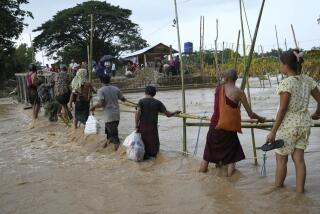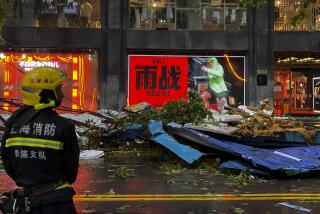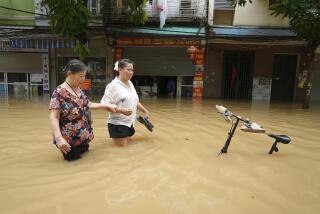Philippines typhoon downgraded, but death toll rises to at least 22

Typhoon Hagupit weakened into a tropical storm Monday as it continued its slow march across the Philippines, leaving at least 22 people dead in its wake, according to the Red Cross.
The storm was packing maximum sustained winds of 53 mph with gusts of 62 mph when it reached the resort town of San Juan on the main island of Luzon, about 60 miles south of the capital, Manila.
By late Monday, it had weakened further, but government officials warned that it could still trigger dangerous storm surges, flash floods and landslides.
Schools, government offices and financial markets in Manila were closed Monday, and residents were evacuated from flood-prone areas of the city, which has a population of more than 12 million.
Officials expressed relief that the storm, known in the Philippines as Ruby, had spared most of the central regions that were devastated by Typhoon Haiyan more than a year ago.
More than 1 million people were evacuated across the archipelago in an effort to avoid a repeat of the massive casualties inflicted by Haiyan, which left more than 7,300 people dead or missing.
In the latest storm, at least 19 people were killed on the island of Samar, where Hagupit first made landfall late Saturday, flattening homes, toppling trees and power lines, and cutting communications, the Philippine Red Cross reported.
Three others died in the central province of Iloilo on Panay island, the Red Cross said. The government’s disaster-response agency was still looking into the reports and had confirmed only two deaths as of Monday evening: a baby girl and a 65-year-old man who died of hypothermia Saturday.
Blocked roads, rough seas and downed communications were making it difficult to establish the full extent of the casualties and damage.
Some residents of Eastern Samar province, which appears to have borne the brunt of the storm, posted signs along the roads appealing for food and water, local news reports said.
The storm, traveling at only about 8 mph, was expected to blow into the South China Sea on Tuesday.
Special correspondent De Leon reported from Manila and Times staff writer Zavis from Los Angeles.
For more international news, follow @alexzavis on Twitter
More to Read
Sign up for Essential California
The most important California stories and recommendations in your inbox every morning.
You may occasionally receive promotional content from the Los Angeles Times.











